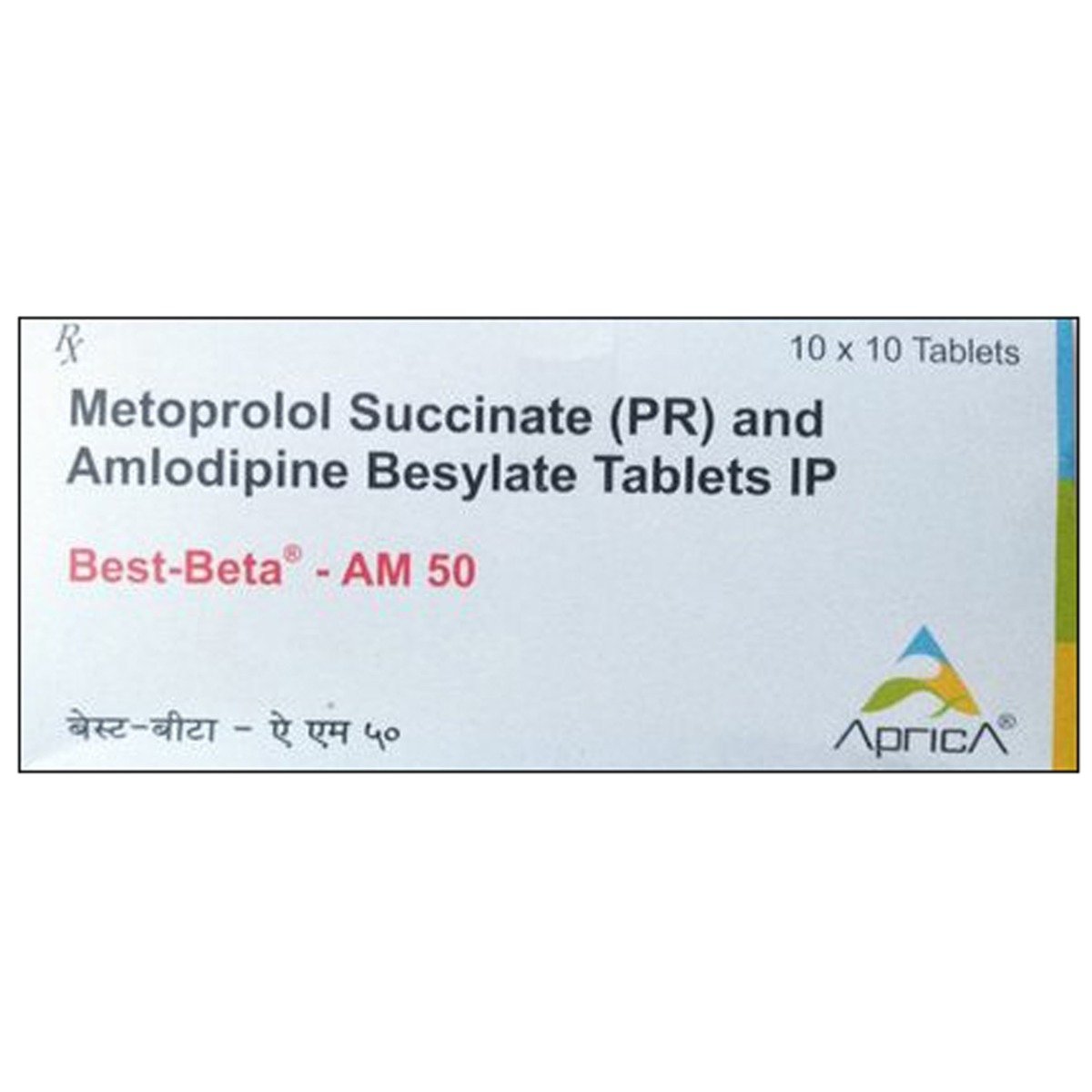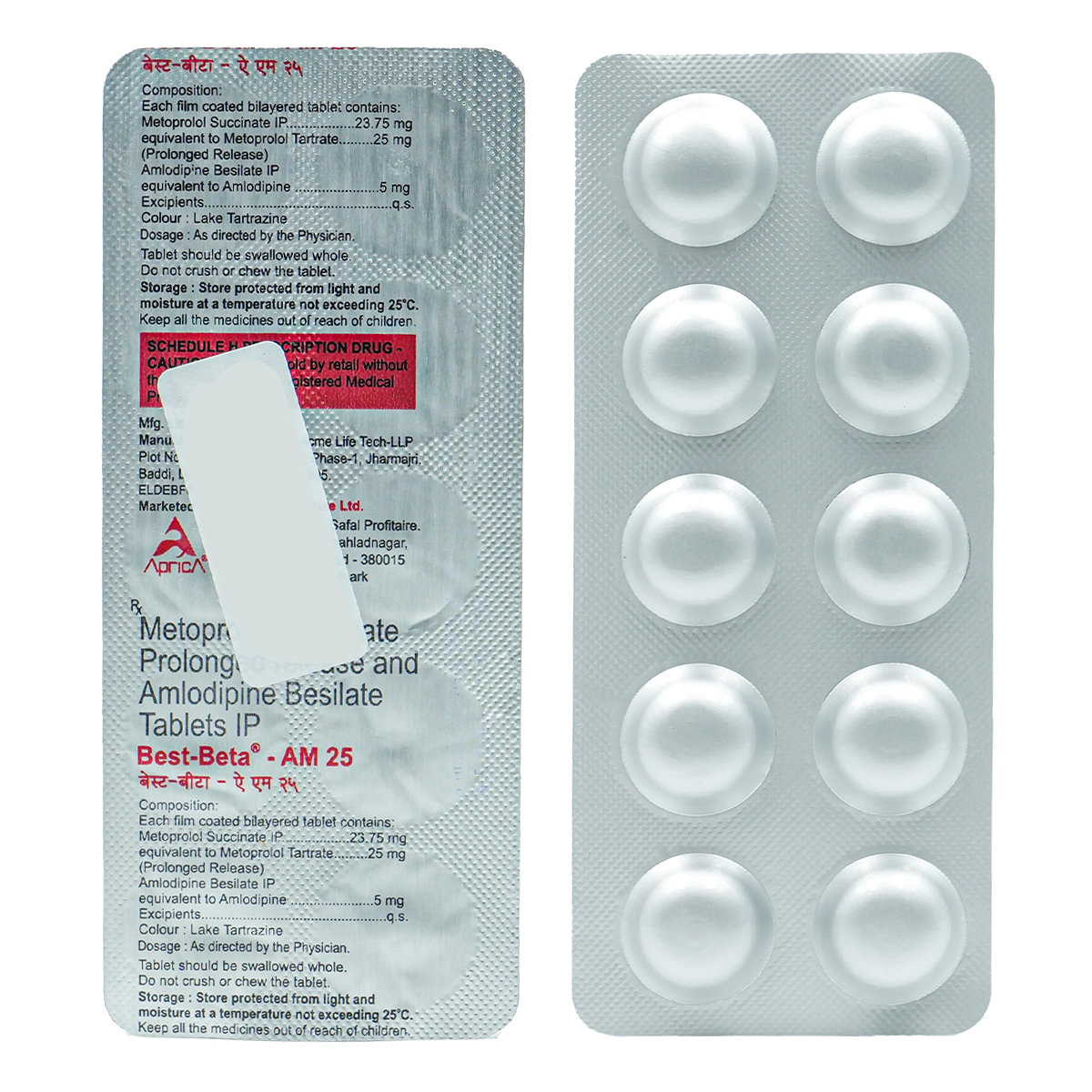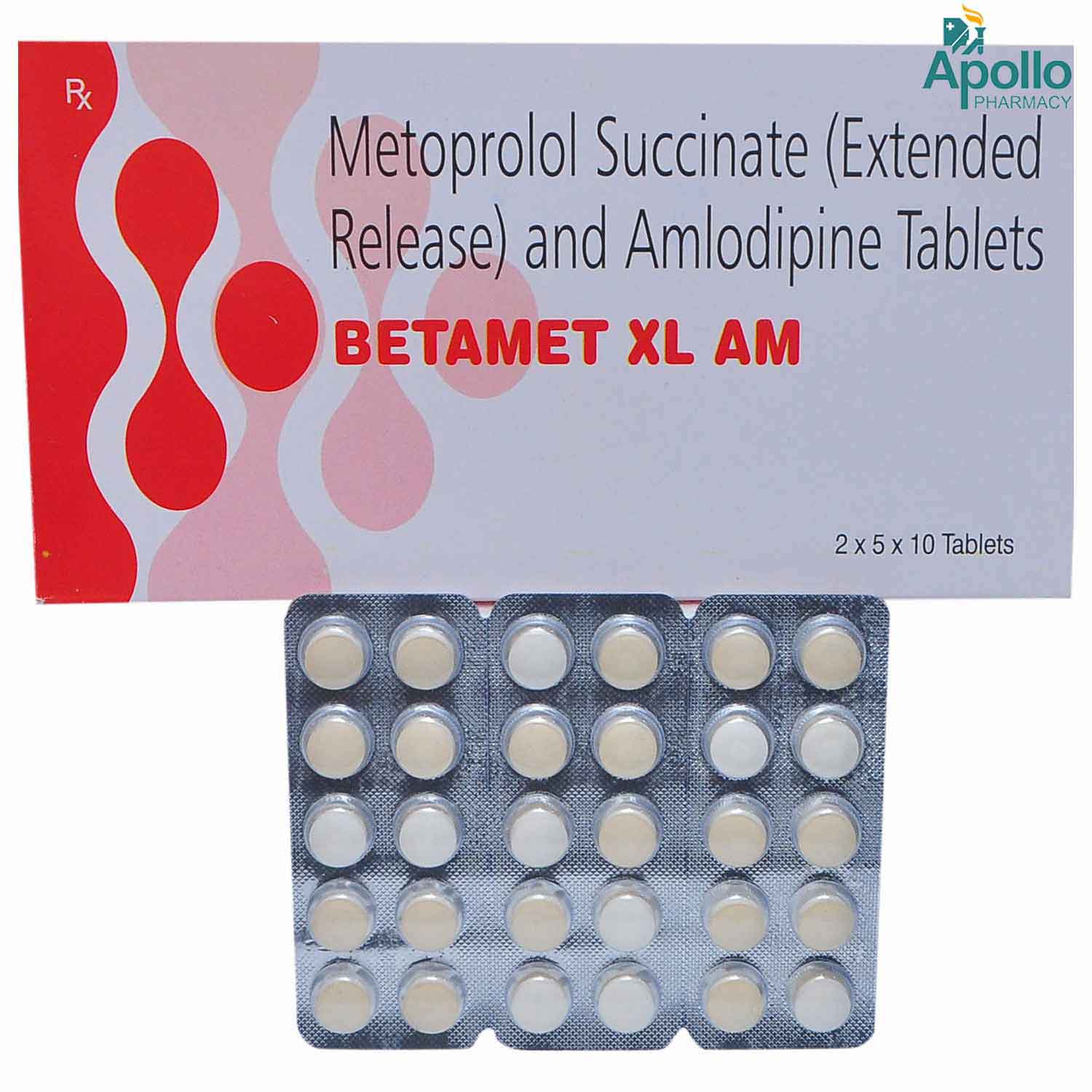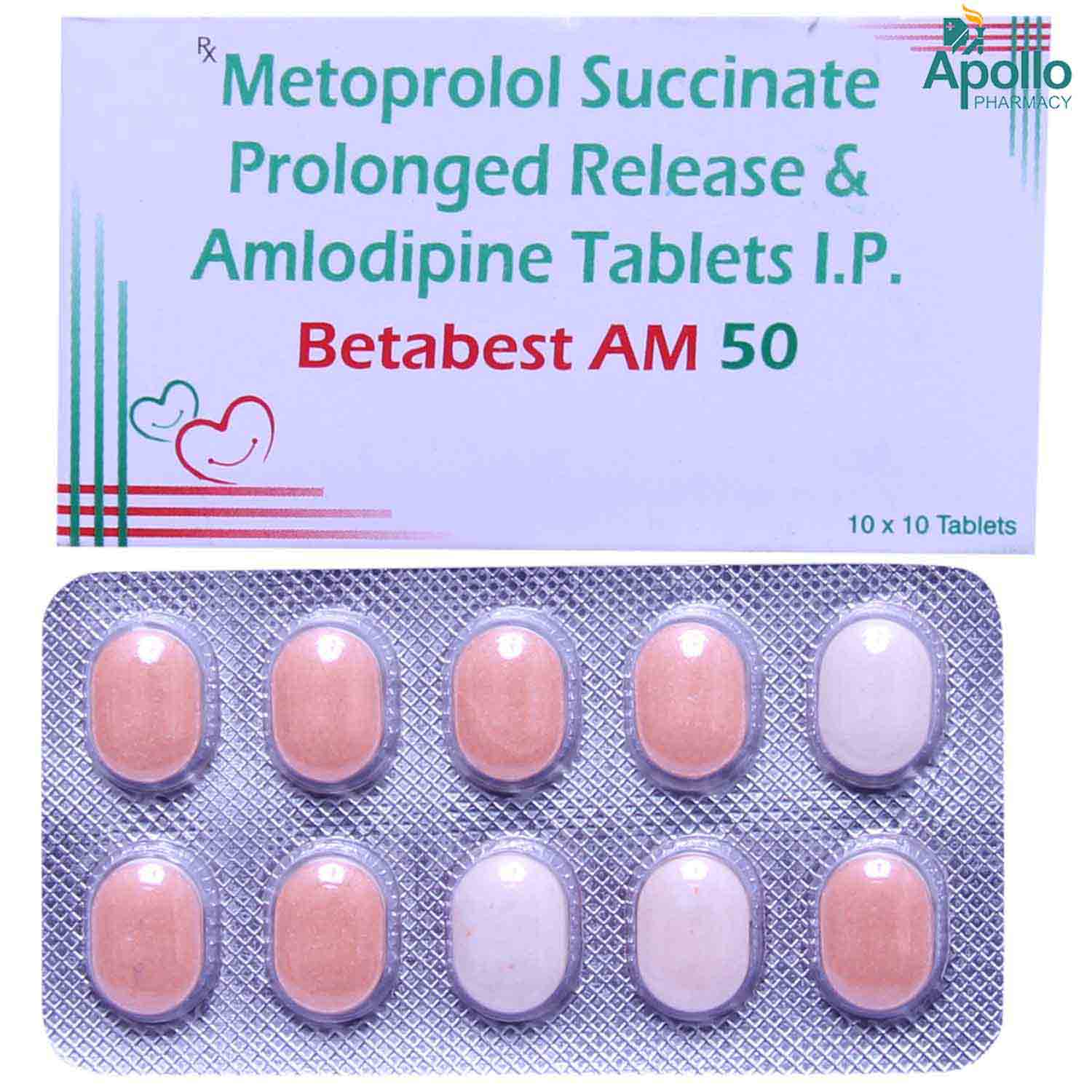Metoprolol+amlodipine
About Metoprolol+amlodipine
Amlodipine+metoprolol belongs to the class of drugs known as antihypertensive, used to treat hypertension (increased blood pressure). Hypertension (high blood pressure) is a lifelong or chronic condition in which the force exerted by the blood against the artery walls becomes so high that it leads to heart disease. If it continues for a long time, the heart and arteries may not function properly. This can damage the blood vessels of the brain, heart, and kidneys, resulting in a stroke, heart failure, or kidney failure. Lowering blood pressure may reduce the risk of stroke and heart attacks.
Amlodipine+metoprolol is a fixed-dose combination composed of two medicines, namely: Amlodipine and Metoprolol. Amlodipine is a calcium channel blocker while Metoprolol belongs to a group of medicines called beta-blockers. Metoprolol relaxes blood vessels by blocking the action of certain natural substances in your body. On the other hand, Amlodipine widens and relaxes the blood vessels making the heart more efficient at pumping blood throughout the body. Together, it helps to lower high blood pressure, reducing the chances of heart attack or stroke. Amlodipine+metoprolol is prescribed to adults and children more than six years of age.
Amlodipine+metoprolol can be taken with or without food as directed by your physician. Swallow the whole tablet with a glass of water. Do not crush, chew, or break it. Amlodipine+metoprolol is preferable to take at the same time every day for better results. Amlodipine+metoprolol is generally safe to consume. Some people may experience nausea, vomiting, diarrhoea, fatigue, headache, low heart rate, and breathlessness. Most of the side effects of Amlodipine+metoprolol do not require medical attention and gradually resolve over time. However, if the side effects are persistent, reach out to your doctor.
Don't stop taking $ name without talking to your doctor first. Stopping Amlodipine+metoprolol gradually may cause changes in your heart rhythm and blood pressure, cause chest pain, or a heart attack. Your doctor will lower your dose gradually over some time to help prevent these symptoms. It is advisable to drink plenty of fluids while taking this medicine to overcome muscle weakness, dry mouth, and extreme thirst. Do not take grapefruit or grapefruit juices with Amlodipine+metoprolol as it can increase the concentration of Amlodipine+metoprolol and worsen its side effects.
Uses of Metoprolol+amlodipine
Medicinal Benefits
Amlodipine+metoprolol is used to treat heart-related conditions like angina (chest pain) and high blood pressure. Amlodipine is a calcium channel blocker that inhibits the entry of calcium (ions) across the heart that relaxes and widens the heart smooth muscles for better blood flow. Metoprolol plays a vital role in relaxing our blood vessels and lowering blood pressure by blocking the action of certain natural substances in your body. Besides this, Amlodipine+metoprolol help prevent spasm of the coronary artery and reduces how hard the heart has to work to pump blood around the body, lowering its oxygen requirements. It improves an individual’s tolerance to physical activity and exercise to keep their blood pressure normal during exercise. As a result, heart rate is at maximum, and exercise does not affect the blood pressure in anyways.
Directions for Use
Storage
Side Effects of Metoprolol+amlodipine
- Oedema (swelling)
- Dizziness
- Flushing
- Palpitation
- Vertigo
- Bradycardia (slow heart rate)
- Headache
- Feeling exhausted
- Swollen ankles
- Flushing
- Stomach upset
- Increased levels of potassium in the blood
- Dry mouth
- Change in taste
- Blurred vision
- Difficulty in breathing
- Cold fingers or toes
Drug Warnings
Don't stop taking the medication without talking to your doctor first. Stopping Amlodipine+metoprolol gradually may cause changes in your heart rhythm and blood pressure, cause chest pain, or a heart attack. Your doctor will lower your dose gradually over a period of time to help prevent these symptoms. Amlodipine+metoprolol can cause low blood sugar (hypoglycaemia). This medication should be used with caution if you have diabetes, particularly if you are taking insulin or other diabetes drugs that may cause low blood sugar. This medication can also induce low blood sugar in babies, children and adults who do not have diabetes. Do not take Amlodipine+metoprolol if you have asthma or similar breathing difficulties. It could make your asthma severe.
Drug Interactions
Drug-Drug Interaction: Amlodipine+metoprolol is known to interact with blood pressure-lowering drugs (acebutolol, atenolol, bisoprolol, carteolol, esmolol, metoprolol, nadolol, nebivolol, sotalol, lisinopril, enalapril, diltiazem, prazosin, terazosin, doxazosin), asthma medications (theophylline), diuretics (fluoxetine), an antidepressant (paroxetine), heart rhythm related medicines (propafenone, digoxin), antifungal (ketoconazole, itraconazole), and antiviral (ritonavir).
Drug-Food Interaction: Amlodipine+metoprolol severely interact with grapefruit and rich protein foods. Hence it should not be taken with Amlodipine+metoprolol. Using Amlodipine+metoprolol together with multivitamins/minerals may decrease the effects of Amlodipine+metoprolol. If it necessary to take you should maintain at least 2 hours of a gap in between the administration of Amlodipine+metoprolol and multivitamins/minerals.
Drug-Disease Interaction: Amlodipine+metoprolol should not be given to the people with diabetes, asthma, cardiogenic shock (when the heart fails to pump required blood to the body), heart valve problem (stenosis), low blood pressure (hypotension), coronary heart disease, liver disease or heart failure.
Drug-Drug Interactions Checker List:
Safety Advice

Alcohol
unsafeYou are recommended not to consume alcohol along with Amlodipine+metoprolol to avoid unpleasant side-effects.

Pregnancy
cautionAmlodipine+metoprolol is not recommended during pregnancy unless your doctor considers it essential. Your doctor will weigh the benefits and any potential risks before prescribing it to you.

Breast Feeding
unsafeAmlodipine+metoprolol is not recommended while breastfeeding.

Driving
unsafeAmlodipine+metoprolol is unlikely to affect your ability to drive or to operate machinery. However, some people may occasionally feel dizzy or tired when taking Propranolol. If this happens to you, ask your doctor for advice.

Liver
cautionAmlodipine+metoprolol to be taken with caution, especially if you have a history of Liver diseases/conditions. The dose may have to be adjusted by your doctor.

Kidney
cautionAmlodipine+metoprolol to be taken with caution, especially if you have a history of Kidney diseases/conditions. The dose may have to be adjusted by your doctor.

Children
unsafeThe safety and efficacy of Amlodipine+metoprolol in children have not been established. Amlodipine+metoprolol is not recommended in children.
Habit Forming
Diet & Lifestyle Advise
- Keep your weight under control with BMI 19.5-24.9.
- Do regular physical activity or exercise for at least 150 minutes per week, or about 30 minutes most days of the week. Doing this can help you to lower your raised blood pressure by about 5 mm of Hg.
- Limit intake of sodium chloride (table salt) in your daily diet to 2300 mg per day or less than 1500 mg is ideal for most adults.
- If you are taking alcohol then only one serving for women and two servings for men is advisable.
- Quitting smoking is the best strategy to lower the risk of heart disease.
- Avoid chronic stress as it can raise your blood pressure. Try to enjoy and spent time with your loved ones to cope with stress and practice mindfulness techniques.
- Monitor your blood pressure daily and if there is too much fluctuation then immediately contact your doctor.
- Try to include heart-healthy omega 3 fatty acid containing food drinks in your daily diet. You can also use low-fat cooking oil like olive oil, soybean oil, canola oil, and coconut oil can help in lowering your elevated blood pressure.
Patients Concern
Disease/Condition Glossary
Blood pressure is the measurement of the force that our heart uses to pump blood to all parts of the body. Hypertension is a chronic condition when blood pressure is too high. This condition can lead to hardened arteries (blood vessels), decreasing the blood and oxygen flow to the heart. Raised blood pressure can cause chest pain (angina) and heart attack (when blood supply to the heart is blocked). Additionally, high blood pressure also causes brain damage (stroke) and kidney failure. High blood pressure can be diagnosed with the help of a blood pressure monitor or sphygmomanometer. Systolic pressure is the pressure when the heart pumps blood out. On the other hand, diastolic pressure is the pressure when your heart is at the resting stage between heartbeats. If your blood pressure is 140/90 mm of Hg, it means the systolic pressure is 140 mm of Hg and, diastolic pressure is 90 mm of Hg. Ideal blood pressure should be between 90/60 mm of Hg and 120/80 mm of Hg.
FAQs
No, you are advised to inform your doctor and monitor your blood pressure for at least two weeks before stopping the medicine. Depending upon your current blood pressure readings, there is a possibility your doctor may lower your medicine dosage and not recommend to discontinue it.
In case, you have missed a dose of Amlodipine+metoprolol, you are advised to take it as soon as you remember. However, try not to miss a dose in the first place, if it's time for you to take your next dose, then do not take both doses together. Take only one dose, taking a double dose of Amlodipine+metoprolol will lead to low blood pressure.
When you are taking a beta-blocker, your health care provider may recommend that you limit your consumption of bananas and other high potassium foods including papaya, tomato, avocado and kale.
Amlodipine+metoprolol can be safely taken as long as your doctor has prescribed it to you. Conditions such as high blood pressure are life-long conditions and one should not abruptly discontinue it without discussing it with a doctor.
Yes, Amlodipine+metoprolol is contraindicated in people with known allergy to any of the components of this medicine. It should be avoided in people with severe kidney or liver impairment and in people with anuria (reduction or absence of urine). It should also be avoided in women who are in the second and third trimesters of their pregnancy.
It's unlikely that Amlodipine+metoprolol affects fertility in men or women. However, there's not enough evidence to say for certain. For the best advice, consult your doctor.
Yes, Amlodipine+metoprolol is known to cause ankle swelling. Please try to keep your feet up when sitting for long hours. If the problem persists still, consult your doctor and do as advised.
Yes, Amlodipine+metoprolol can cause dry mouth. Therefore, it is always advised to increase fluid intake while taking Amlodipine+metoprolol. If you still feel excessively thirsty, please consult your doctor and do as advised for best results of Amlodipine+metoprolol.









